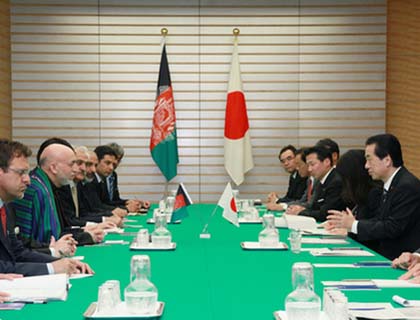Afghanistan and Japan have a historical relation and for many Afghans, Japan is a model of success in the globe. There are a lot of good welling and good feeling about Japanese in Afghanistan. They are very well known in Afghanistan for their hospitality and their tradition.
These exceptional good feelings of the Afghan people about Japanese are more than the tradition, because they have been helping Afghans since decades. The support and assistance of Japan for the people of Afghanistan has even continued during the Taliban regime. Either inside or outside of Afghanistan, Japan has continued its assistance and support to the Afghans, which every single Afghan appreciates and will remember forever.
The first Tokyo conference on Afghanistan was considered as millstone and people are looking forward for the upcoming conference in July. Since 2001 Afghanistan with the support of international community, particularly in Asia with the support of Japan, has achieved tremendous amount of success. The successes are not limited to security. It is in every aspect of life, including, education, health, freedom of speech, governance, human and women rights. Afghan people appreciate these joint achievements and the credit also goes to the countries and citizens of the countries, who have greatly contributed by their life and money. In last one decade Japan has greatly and generously contributed for the peace, stability and development of Afghanistan.
Most of the time the negative stories have been broadcasted from Afghanistan and rarely people talk about those achievements. Here I don't want to draw unreal picture of Afghanistan, but I want to tell what people can't read and hear often. The positive changes, differences and achievement of last ten years make a very long list and it will take months to write about every item in the list. But as a great example I can say that today's Afghanistan is not an international threat and it is not save haven of terrorist to plan and execute their terrorist attacks on other countries. But today Afghanistan is a country with an elected government, elected parliament, vibrant media, political parties and civil society organizations. Where people can freely talk and debate about their better future.
Of course still it is not a perfect country and we are not expecting to have a country like Japan in very near future. But what we want is to secure the achievements of last ten years and build on that.
The process of transition, which will be completed by end of 2014, is a good sign of going towards a self-sustained Afghanistan. To build on the transition process and enable Afghanistan for being a self-sustained country in the future, the international community agreed to support Afghanistan for a decade of transformation, which will start after 2014 and continues to 2025. This is a very strong and long-term commitment.
fghans have also realized their responsibility and they do not want to be a burden on the shoulder of international community, thus they have welcomed the transition process and working hard to complete the process with success.
There are good mutual commitments and understanding among the Afghan government and international community in order to support Afghan people. But Afghanistan still lacks a comprehensive and coordinated plan for achieving those goals. Afghanistan does not need only military support, but it needs civilian and political cooperation for permanent solution. In last ten years much of the international community efforts have been focused on military aspects and solutions. But it is the time to shift the focus and efforts to civilian and development. In order not to ruin the investments, Afghanistan and its international allies should work on a long-term strategic solutions in the areas like; good governance, rule of law, justice, human rights and fighting corruption. One of the major issues for Afghanistan is corruption and it must be addressed to guarantee the efficiency of all the efforts.
Afghans are ready to take the lead and responsibility, but the support, assistance and advice of the international community are also important. When there are talks about the civilian sides of cooperation, such as: developments, technology and good governance Japan comes at the top of the list. Afghans strongly believe on the loyalty, sympathy and expertise of Japanese, which can play a vital role for better, and stable Afghanistan and region - particularly in the aspect of extractive industries and mining sector of Afghanistan.
The natural resources, minerals and mines in Afghanistan, are the guaranty for the better future of Afghanistan, but for extracting these assets Afghanistan will need technical assistance of its international allies, particularly Japan. The mines, which cost trillions of USD, are not only a source for the stability of Afghanistan, but they are what the human beings around the world will need in order to fulfill the demands.
Many Afghans believe that the Tokyo conference on Afghanistan is considered as one of the last opportunities for the better future of Afghanistan. Thus Afghan people together with their international allies have been working so hard to have wanted outcomes from such a major conference. So the conference is a good opportunity for Afghanistan and its partners to secure their investments and achievements. If the right decisions are made in this conference, in long-term Afghanistan and its partners will be greatly benefited.
Mohammad Shafiq Hamdam is social activist for promoting peace, justice and human rights. He is founder and Chairman of Afghan Anti-Corruption Network, a leading network of civil society organizations fighting corruption, member of Afghan Civil Society for Advocacy. He is a writer and an analyst, as well. He is Associate of Hiroshima Peace Building Center of Japan.

